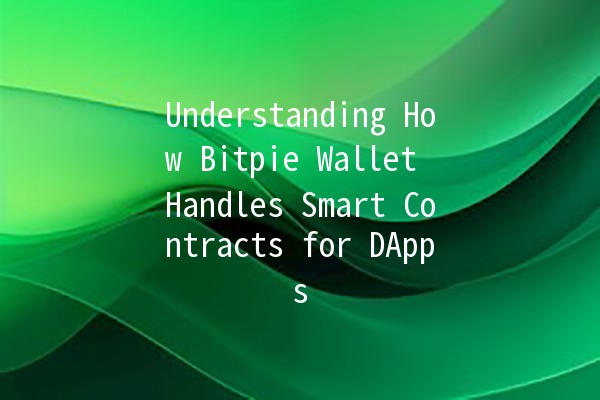
As cryptocurrency and blockchain technology continue to reshape the digital landscape, understanding tools like the Bitpie Wallet becomes crucial for both developers and users. The Bitpie wallet offers a seamless way to interact with decentralized applications (DApps) and manage smart contracts. This article delves deep into how Bitpie operates with DApps and provides five productivityenhancing techniques to maximize your experience with smart contracts.
What is Bitpie Wallet?
Bitpie Wallet is a cryptocurrency wallet that supports various digital assets and enables users to manage their tokens conveniently. Its integration with DApps and smart contracts makes it a popular choice among crypto enthusiasts and developers alike. Users can access a variety of DApps directly through the wallet interface, making transactions quick and efficient.
Key Features of Bitpie Wallet:

How Does Bitpie Wallet Handle Smart Contracts?
Smart contracts are selfexecuting contracts with the terms of the agreement directly written into lines of code. They automatically execute transactions when predefined conditions are met. Bitpie Wallet simplifies interacting with these contracts, enabling users to effortlessly engage with DApps and execute transactions.
The Process of Handling Smart Contracts in Bitpie
Five ProductivityEnhancing Techniques for Using Bitpie Wallet with Smart Contracts
One effective way to familiarize yourself with smart contracts is to use a blockchain test network (testnet). This enables you to deploy and interact with smart contracts without putting real assets at risk. Bitpie Wallet supports various testnets, allowing users to practice deploying contracts, test DApps, and experiment with transactions.
Practical Example: Before launching a new DApp, run tests on a testnet to ensure everything works as expected. This minimizes risks and potential financial losses during deployment.
Transaction fees on the Ethereum network, known as gas, can vary significantly. Bitpie Wallet allows users to customize their gas prices, which can lead to more efficient transactions. Understanding how to manage gas settings effectively can enhance your productivity by saving you money on transaction fees.
Practical Example: Monitor peak times for network activity and adjust gas settings accordingly to minimize costs while ensuring your transactions are processed promptly.
As users engage with multiple DApps, it can become challenging to keep track of interactions and transactions. Bitpie Wallet provides a feature to categorize and manage your DApps effectively. By creating custom groups for DApps, you can streamline your workflow.
Practical Example: Have separate categories for finance, gaming, and social DApps. This way, you can quickly access the DApp you need without wasting time searching.
Regularly auditing smart contracts is crucial for maintaining security and efficiency. Bitpie Wallet integrates with various audit services that analyze your contracts for vulnerabilities. Make it a habit to audit your smart contracts before any significant deployment.
Practical Example: Schedule quarterly audits of your highprofile contracts to ensure they're secure and functioning correctly. This can prevent potential exploits and save considerable resources in the long term.
Joining communities focused on Bitpie Wallet and smart contracts can provide you with invaluable insights and support. Platforms like Reddit, Telegram, and Discord offer forums where users share tips, experiences, and solutions to common challenges.
Practical Example: Participate in discussions about the latest DApp trends and share your projects for feedback. Engaging with the community can lead to collaborative opportunities and innovative ideas.
FAQs
What is a smart contract, and how does it work?
A smart contract is a digital contract that autoexecutes actions when predetermined conditions are met. Stored on a blockchain, smart contracts utilize code to enforce agreements without needing intermediaries, ensuring trust and transparency in transactions.
What are DApps?
Decentralized applications (DApps) are applications that run on a distributed network, utilizing smart contracts on blockchain technology. Unlike traditional apps, DApps do not rely on a central server, enhancing security and ownership for users.
Can I create my smart contracts using Bitpie Wallet?
Yes, Bitpie Wallet offers tools that allow users to draft, deploy, and interact with smart contracts directly from the wallet. You can use programming languages like Solidity to create smart contracts tailored to your specific needs.
Is Bitpie Wallet safe for storing my cryptocurrency?
Bitpie Wallet employs various security measures, including encryption and access control, to protect users' assets. However, users should also follow best practices, such as utilizing strong passwords and enabling twofactor authentication to enhance security.
How can I minimize transaction fees when using Bitpie Wallet?
You can minimize transaction fees by adjusting gas settings within the Bitpie Wallet. Monitoring network activity and conducting transactions during offpeak times can also help reduce costs.
What should I do if I encounter issues with my transactions?
If you experience issues with transactions, check the transaction history on the Bitpie Wallet for details. Additionally, you can reach out to Bitpie's support team or consult community forums for assistance.
By exploring the capabilities of Bitpie Wallet and mastering its interaction with DApps, users and developers can significantly enhance their blockchain experience. Implementing the techniques highlighted in this article will enable you to navigate smart contracts efficiently, boost productivity, and optimize your engagement within the crypto ecosystem.

